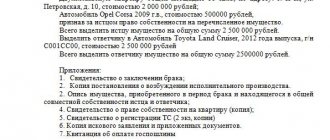There is an opinion that the conclusion of compensation agreements provided for by the Russian Federation between spouses is possible. Indeed, there are such concepts as freedom of contract, the rights of subjects - participants in civil legal relations. However, if the spouses’ property is in legal regime, that is, a marriage contract has not been concluded or an agreement on the division of joint property has not been signed, the spouses cannot enter into compensated transactions between themselves
The Family Code of the Russian Federation allows for the division of property of spouses during marriage. Accordingly, in this situation, the regime of joint ownership ceases, and separate owners appear, who can make any transactions among themselves. Until this moment, compensated transactions between spouses are void, since otherwise it turns out that one spouse transferred to the other the property that the latter already owned (all property in a marriage is presumed to be common, jointly acquired). By virtue of Part 1 of Art. 170 of the Civil Code of the Russian Federation, which states that “an imaginary transaction, that is, a transaction made only for show, without the intention of creating legal consequences corresponding to it, is void”, it follows that the transaction under a paid agreement between spouses is imaginary. Since a transaction is recognized as an action aimed at establishing, changing or terminating civil rights and obligations, a compensation agreement concluded between spouses regarding jointly acquired property does not lead to the establishment, change or termination of civil rights and obligations. Thus, an object of common joint property transferred, for example, under a purchase and sale agreement, acquired at the expense of the common funds of the spouses, continues to remain in the joint ownership of the spouses even after the conclusion of the agreement, which means that agreements of this kind between spouses cannot be qualified otherwise than imaginary transactions , that is, transactions made only for show, without the intention of creating corresponding legal consequences. Under the regime of common joint ownership, compensated transactions between spouses are invalid due to the absence of the moment of transfer of ownership, and an indication of this moment must be contained in any transaction for the alienation of property. When concluding such agreements, the composition of the property of each spouse does not change. The spouses remain in the same position as before the conclusion of the contract. And this does not correspond to the nature of the compensated contract and the requirements of civil law, according to which when the owner alienates his property to other persons, his property right is terminated, and the acquirer accordingly acquires it. As an example, we can cite a situation where, when considering a case on the division of joint property in court, a claim was simultaneously filed to recover funds on the basis of a loan agreement between the spouses. Of course, the purpose of filing such claims was the plaintiff’s attempt to create non-existent debts in order to reduce the amount of compensation for illegally alienated property acquired during the marriage. This property was the subject of a civil case regarding the division of joint property. The defendant’s side, in addition to the above arguments, stated that the money transferred by the spouse, subject to their recognition as joint, is also the property of the other spouse. It becomes obvious that in this legal relationship the spouses act, on the one hand, as a creditor, on the other, as a debtor. Consequently, according to the terms of Art. 413 of the Civil Code of the Russian Federation, obligations terminate from the moment the contract is concluded due to the coincidence of the creditor and the debtor in one person. A petition was also filed to appoint an expert examination of the submitted contract. The plaintiff, having listened to all the arguments and justifications for the inconsistency of his position, abandoned his claims. Thus, we believe that, based on the above provisions, spouses cannot enter into any compensation agreements between themselves regarding jointly owned property. If such transactions are concluded, they are void of the contract due to the coincidence of the same person as the creditor and the debtor. A petition was also filed to appoint an expert examination of the submitted contract. The plaintiff, having listened to all the arguments and justifications for the inconsistency of his position, abandoned his claims. Thus, we believe that, based on the above provisions, spouses cannot enter into any compensation agreements between themselves regarding jointly owned property. If such transactions are concluded, they are void
Transactions related to the matrimonial property regime
Three property regimes may apply between married spouses:
- joint ownership regime;
- shared ownership regime;
- personal property regime.
Let's consider what transactions spouses can make between each other in each of the property regimes.
Joint ownership regime.
Before the spouses choose a contractual regime, it is assumed that in relation to the property acquired by the spouses during marriage at the expense of common income, the legal regime is in force - the regime of joint ownership. After the dissolution of a marriage, the regime of joint ownership does not terminate automatically, but is maintained until the division of the spouses’ common property.
This regime is established by law. By virtue of Article 34 of the Family Code of the Russian Federation, property becomes the joint property of the spouses, regardless of which spouse it was acquired in the name of.
Under this regime, spouses cannot enter into compensated transactions with each other, since such transactions contradict the norms of civil and family law. After all, the property still ends up being jointly owned.
But within the framework of the joint property regime, spouses can enter into gratuitous transactions, for example, gift agreements. But there is one peculiarity. The text of the agreement itself must stipulate that the property was acquired specifically with the personal funds of the spouse who is giving the gift. Under such a transaction, the property becomes the personal property of the other spouse (the one to whom the gift is given).
Shared ownership regime.
The main feature of this regime is that, unlike the joint property regime, it is established not by law, but by an agreement between spouses.
Spouses can enter into a marriage contract, which introduces a regime of shared ownership in relation to all or some types of property. They can enter into an agreement on the division of property.
But spouses can, even without the above-mentioned agreements, acquire real estate into common shared ownership. But to do this, they must formalize the deal by concluding an agreement. Moreover, the spouses must notarize the agreement and then register it with Rosreestr.
In this case, only in relation to this particular property will the regime of joint ownership be changed to the regime of shared ownership.
In the shared ownership regime, spouses can only enter into gratuitous transactions with each other.
Personal property regime.
Property is the property of a spouse if it:
- acquired by him before marriage;
- received during marriage free of charge under a gift agreement;
- received during marriage by inheritance;
- purchased during marriage with personal funds.
In relation to their personal property, spouses can make both gratuitous and compensated transactions between themselves.
New rules for the division of marital property are being introduced in the Russian Federation
Collage: Legal.Report The State Duma adopted in the first reading a bill that proposes to change the norms of legislation regulating the property relations of spouses (LR talked about this initiative here). For example, it is proposed to adjust a number of provisions on the division of common property of spouses, on the marriage contract and on the bankruptcy of individuals.
“Today this issue [about the division of property] has become very acute. Because the stratification of society is large and, naturally, many people have a lot of property and in large amounts,” the co-author of the law, the head of the State Duma Committee on Family, Women and Children, Tamara Pletneva, told the deputies.
The speaker clarified that a number of changes are planned to be made to the law on state registration of real estate, on acts of civil status, to the Fundamentals of Legislation on Notaries, as well as to the Family Code.
The bill proposes to directly reflect in the RF IC the rule that the common property of spouses includes movable and immovable things, property rights (including non-cash funds, uncertificated securities, shares in the authorized capital of business companies, shares in production cooperatives), as well as common debts (obligations) of the spouses.
— The common property of the spouses is proposed to be considered as the totality of all “assets” and “liabilities” acquired by the spouses during marriage. That is, as an integral property complex, and not as a set of individual objects,” clarified the co-author of the initiative, the head of the “legislative” committee of the State Duma Pavel Krasheninnikov.
The general obligations of the spouses (“liabilities”) are proposed to include those that arose during the marriage as a result of the conclusion of an agreement or as a result of unjust enrichment. Exceptions - if the court determines that the obligation arose during the period of separation of the spouses upon the termination of family relations or that one of the spouses received under the obligations was not used for the needs of the family.
The bill proposes to indicate the inadmissibility of splitting up so-called business assets, in particular a controlling stake in a company. Rights to objects, the division of which into parts between spouses is impossible or would entail a disproportionate decrease in value, will be recognized by the court as belonging to one of the spouses on account of the value of his share in the common property. If the value of such property exceeds the value of the spouse’s share, then monetary compensation will be recovered in favor of the other spouse.
It is provided that transactions involving the alienation of common property without the consent of the other spouse are grounds for reducing the size of the share in the common property due to the alienating spouse. In addition, a spouse (former spouse), who did not know about the acquisition of any property during the marriage by the other spouse, will be able to protect his interests after a divorce and demand the transfer of the appropriate amount of rights to such property to him, based on the established size of shares in all property .
The bill proposes to exclude the possibility of a broad interpretation of the invalidation of a marriage contract (according to the current provisions of the RF IC, a marriage contract can subsequently be declared invalid by a court if its terms put one of the spouses in an “extremely unfavorable position”).
In case of bankruptcy of one of the spouses, it is proposed to first allocate the share of the debtor spouse in the common property, and only then to foreclose on his obligations on this share according to the general rules. It is also proposed to supplement bankruptcy procedures for individuals with rules on the possibility of joint bankruptcy of spouses who have common debts. This will be possible upon their application.
An almost automatic procedure is provided for including in the Unified State Register of Information about the ownership of real estate by both spouses at the same time (common joint property). State registration of joint property will be carried out both on the basis of an application from one of the spouses, and on the basis of a decision of the state registrar of rights in the event that this right arises by force of law. The registrar will be obliged, in the manner of interdepartmental information interaction, to request information about the presence or absence of a marriage from each citizen who applies for registration of ownership of real estate (on the basis of a paid transaction).
The changes proposed by the bill will make it possible to bring stability and certainty to the property relations of spouses (both during marriage and in the event of divorce), taking into account existing economic opportunities, Krasheninnikov concluded.
Property and shares of spouses will be divided according to new laws
Purchase/sale of property during marriage
Photo by Pexels
When selling or buying property during marriage, spouses are required to comply with the norms of the Family Code.
It stipulates a mandatory condition for the sale of property: voluntary notarial consent of the second spouse. In the case of a purchase, consent is not required by law, however, the funds spent on the purchase are considered joint property. Thus, a purchase without the consent of the second spouse can be appealed.
The notarized consent of the second spouse is not required if the purchase is made jointly, with the personal presence of the other half and they become co-owners, or if the procedure for purchasing property without the consent of the other half is specified in the marriage contract.
Gift of property during marriage
Spouses can receive or alienate real estate free of charge by concluding a notarial deed of gift. The specifics of regulation of this type of transaction depend on several factors:
- who is the participant in the transaction;
- whether shares in the property are allocated.
To make it clearer, let's give a few examples.
- The spouse received property as a gift while married. In fact, it is personal property. But, if during the course of family life it was improved, then it is quite possible that the property can be recognized as common in court or by agreement (it is also certified by a notary). In fact, the consent of the other half to a transaction with such property is not required. However, in the future the spouse may challenge the deal, so it’s better to be on the safe side.
- A husband and wife intend to donate property to a third party. If shares in the common property are not allocated and it is in the common ownership regime, then consent to the transaction is necessary. If the shares are allocated, then each spouse has the right to dispose of their share without the consent of the other half.
- The spouse gives property (or shares thereof) to the second spouse. In such a transaction, the consent of the other half is not necessary.
What is the validity period of the consent
The spouse’s consent to the alienation of real estate or its purchase is valid until the completion of the transaction for which it was given. The law does not otherwise limit the validity period of consent, unless otherwise stated in the document itself. In some cases, the validity period of the consent can be stated directly in the text of the consent. For example, give consent for a period of a month, a year, etc.
In addition, various details of consent to the transaction can be entered into the document:
- purchase or sale price;
- description of a specific object of purchase or sale, etc.
- Is it possible to revoke consent?
Cancellation of a spouse's notarial consent is permissible due to the fact that consent is a unilateral transaction and can be canceled or changed. Cancellation or so-called withdrawal of consent must also be done in notarial form.
How is consent obtained?
Consent is a notarized document that is drawn up in the form prescribed by law and certified.
To draw up consent and receive a form, you must contact a notary with a passport and marriage certificate. The price of the service varies from 1,500 to 3,000 rubles, depending on the region. The notary office will ask you:
- passport details of the spouse giving consent;
- description of the real estate - the object of the transaction (you need to take with you documents on ownership);
- description of the essence of the transaction (essence of the transaction, conditions, price, etc.).
The document is drawn up in two copies, it is marked with the date, the signature of the person giving consent and the signature of the notary. One document is given to the spouse, who consents to the transaction, the second remains in the archives of the notary’s office.
Claims of the former spouse to part of the property
Before purchasing real estate, the buyer should ask the question: who is the seller of the real estate, and if he is not currently married, then perhaps he was previously married?
Perhaps the property that is being sold was purchased by the seller during the marriage, or was it purchased by the buyer before the marriage, but during the marriage the second spouse paid for repairs to the property, which significantly increased its value?
If this is so, then on the basis of Art. 34, 37 of the Family Code of the Russian Federation, such property, regardless of who it is registered in, is recognized by the court as jointly acquired property. The former spouse can claim his share in the jointly acquired property, and he can make claims against it within the limitation period.
Limitation period for claims for division of property. Arbitrage practice
In accordance with paragraph 7 of Art. 38 of the Family Code of the Russian Federation, the statute of limitations for claims for division of property is three years.
At the same time, it would be a mistake to think that the specified limitation period begins to run from the moment the spouses divorce.
According to paragraph 19 of the Resolution of the Plenum of the Supreme Court of the Russian Federation dated November 5, 1998 No. 15 “On the application of legislation by courts when considering cases of divorce,” the statute of limitations for claims for division of property begins not from the moment of termination of the marriage relationship, but from the moment when the spouse learned or should have learned about his violated right.
In other words, the ex-spouse may find out about his violated rights a month after the purchase and sale of real estate or several years later. Only from this moment will the statute of limitations begin, during which a claim can be filed to declare the purchase and sale transaction invalid and to divide the jointly acquired property.
The possibility of declaring a real estate purchase and sale transaction invalid at the request of one of the spouses. Arbitrage practice
The grounds for declaring a transaction invalid, as well as the consequences of declaring a transaction invalid, are established by paragraph 2 of the Civil Code of the Russian Federation.
A transaction for the purchase and sale of real estate (jointly acquired property) sold by one of the former spouses, but without the notarized consent of the second spouse, is invalid if a corresponding claim was received within the limitation period from the spouse whose rights were violated.
This legal position is confirmed by existing judicial practice, including the Ruling of the Supreme Court of the Russian Federation dated August 13, 2013 No. 4-КГ13-19.
In particular, according to the Determination, the plaintiff in 2012 filed a claim against her ex-husband and his son and asked the court to recognize the transaction of donating a land plot from father to son as invalid due to the fact that the land plot was acquired by the former spouses during the marriage (since 14 July 1979 to September 30, 1996).
According to the plaintiff, the land plot is jointly acquired property on the basis of clause 1 of Art. 34 of the Family Code of the Russian Federation.
On August 21, 2012, the Odintsovo City Court of the Moscow Region satisfied the plaintiff’s claims against her ex-husband and his son, declaring the land donation transaction invalid in relation to the ½ share in the spouses’ common property, which should belong to the plaintiff.
The appellate instance did not agree with the arguments of the first instance court, and the decision to recognize the transaction as invalid was canceled on the basis that the plaintiff violated the statute of limitations when filing a lawsuit.
As a result of the plaintiff's cassation appeal against the decision of the appellate instance on April 10, 2013, the corresponding case was filed with the Supreme Court of the Russian Federation.
By a ruling of the Supreme Court of the Russian Federation dated July 12, 2013, the case was transferred to the Judicial Collegium for Civil Cases of the Supreme Court of the Russian Federation.
Based on the results of studying the case, the plaintiff’s cassation appeal against the decision of the court of appeal was recognized as justified and satisfied by the Judicial Collegium of the Supreme Court of the Russian Federation.
The Judicial Collegium of the Supreme Court of the Russian Federation established that the former spouse received the corresponding land plot in ownership during his marriage to the plaintiff.
The spouses did not divide property during the dissolution of the marriage or after the dissolution of the marriage.
The ex-husband donated the land plot to his son on 02/08/2012, but did not receive consent to alienate the real estate from the plaintiff.
In addition, the court found that the plaintiff became aware of his violated right in February 2012, that is, the plaintiff did not miss the three-year limitation period for claims for division of property, including taking into account the requirements of Art. 200 of the Civil Code of the Russian Federation.
The Judicial Collegium for Civil Cases of the Supreme Court of the Russian Federation indicated that the appellate court, when making its ruling, erroneously calculated the statute of limitations from the moment of divorce, which contradicts Resolution of the Plenum of the Supreme Court of the Russian Federation of November 5, 1998 No. 15.
Thus, the ruling of the appellate instance was recognized by the Judicial Collegium for Civil Cases of the Supreme Court of the Russian Federation as illegal, and the decision of the Odintsovo City Court of the Moscow Region dated August 21, 2012 was upheld.
Consequences of declaring a transaction invalid at the claim of one of the spouses for the buyer of real estate
As follows from the above example from judicial practice, transactions with real estate concluded with one of the spouses, but without the consent of the second, are recognized by the courts as invalid in terms of the share of property that should belong to the second spouse in the event of division of jointly acquired property.
That is, if the buyer has registered ownership of the property, at the request of the second spouse, the ownership of part of this property will be declared invalid by the court.
It should be taken into account that according to Art. Art. 38, 39 of the Family Code of the Russian Federation, the share of the second spouse can be half of the property acquired during the marriage, and if there are common minor children, even more.
Thus, part of the property acquired by the buyer will become the property of one of the spouses, and the buyer will have the right to demand from the spouse who sold the property the corresponding part of the funds.
Taking into account the current practice of collecting money from former spouses as part of enforcement proceedings, a real estate buyer should hardly hope for a quick return of the money paid for real estate.
At a minimum, the buyer will have to run after the bailiffs so that they check the property status of the spouse who sold the property, and this does not guarantee the buyer will receive real money to repay the debt, since there are many ways to hide your income in order not to pay the bailiff document.
As a result, in most cases, bailiffs in such cases issue documents stating the impossibility of collecting the debt, which, in essence, is a “sentence” for the intentions of the real estate buyer to recover the damage incurred.
Recognition of a real estate purchase and sale transaction as invalid at the claim of creditors. Arbitrage practice
In addition to the claims of the former spouse for part of the real estate sold by one of the spouses, the creditors of the former spouse can also go to court if they become aware that the property was acquired during marriage and sold without the consent of the debtor spouse.
Theoretically, even if the property is sold to a bona fide purchaser, creditors have the right to go to court with a statement of claim to declare the purchase and sale transaction of property invalid and a subsequent demand to foreclose on the share of the debtor spouse in the common property of the spouses, which has already been sold by one of the spouses.
This legal position is confirmed by the Ruling of the Supreme Court of the Russian Federation dated December 4, 2012 No. 41-KG12-21, according to which the division of property can be carried out by the court at the claim of creditors in order to foreclose on the share of one spouse.
In addition, the conclusion about the possibility of a creditor to foreclose on the share of one of the spouses in the common property of the spouses is confirmed by the Ruling of the Constitutional Court of the Russian Federation dated September 24, 2012 No. 1845-O. Procedurally it looks like this.
The creditor applies to the court with a statement of claim to declare the real estate purchase and sale transaction invalid in relation to the share of the debtor spouse, bringing the former spouses to court as well.
If the court establishes that the property sold by one of the spouses is jointly acquired property, and there was no consent of the other spouse to the transaction, the transaction will be declared invalid by the court in relation to the share of the debtor spouse, and this share will be foreclosed on to repay the corresponding obligations.
Thus, the buyer of real estate will have to either buy the share again, but from the bank, or get a new owner of part of his real estate in his neighborhood.
Again, as stated above, recovering actual funds from the spouse who sold the property seems unlikely.







